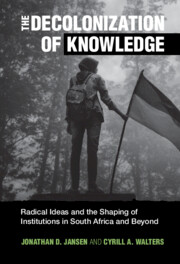 The Decolonization of Knowledge
The Decolonization of Knowledge Book contents
- The Decolonization of Knowledge
- The Decolonization of Knowledge
- Copyright page
- Contents
- Figures
- Acknowledgements
- 1 Introduction
- 2 Institutional Posturing
- 3 On the Institutionalization of Knowledge
- 4 The Contending Meanings of Decolonization and the Implications for Radical Curriculum Change
- 5 Regulating Radical Ideas
- 6 The Uptake of Decolonization
- 7 The Uptake of Decolonization
- 8 How Does a Radical Curriculum Idea Travel through Institutional Life?
- References
- Index
7 - The Uptake of Decolonization
The Case of the Sciences and Engineering
Published online by Cambridge University Press: 22 June 2022
- The Decolonization of Knowledge
- The Decolonization of Knowledge
- Copyright page
- Contents
- Figures
- Acknowledgements
- 1 Introduction
- 2 Institutional Posturing
- 3 On the Institutionalization of Knowledge
- 4 The Contending Meanings of Decolonization and the Implications for Radical Curriculum Change
- 5 Regulating Radical Ideas
- 6 The Uptake of Decolonization
- 7 The Uptake of Decolonization
- 8 How Does a Radical Curriculum Idea Travel through Institutional Life?
- References
- Index
Summary
This chapter describes exemplary curricula in the sciences and engineering that give expression to many of the ideals of decolonization. Despite claims about the value neutrality and universality of the sciences, broadly defined, these exemplars demonstrate how to decolonize curricula in engineering, computer science, occupational therapy, organic chemistry, and archaeology. These curriculum innovators are conscious of the social dimensions of the sciences and what this means for improving the human condition.
- Type
- Chapter
- Information
- The Decolonization of KnowledgeRadical Ideas and the Shaping of Institutions in South Africa and Beyond, pp. 172 - 202Publisher: Cambridge University PressPrint publication year: 2022
